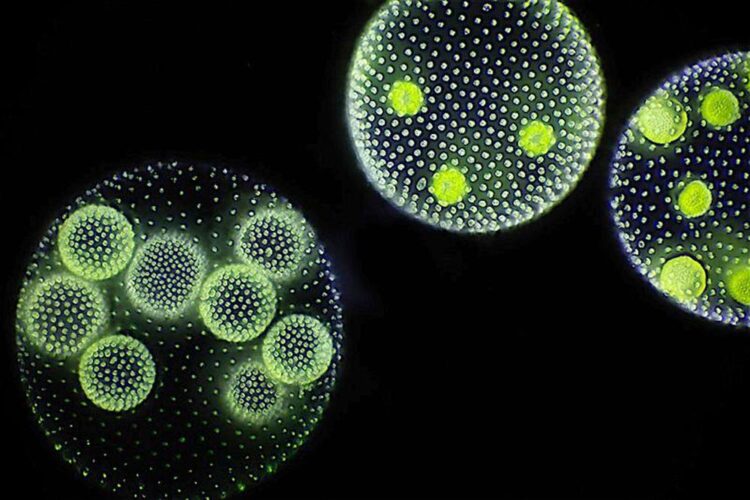Evolution and ecological competition of multicellular life cycles

Volvox daughter colonies within a Volvox mother colony.
Credit: Frank Vox
New studies by the Max Planck Institute for Evolutionary Biology show that competition between different evolutionary developmental stages of multicellular life cycles can be important for the development of an entire population. Without direct competition, only the growth rate of a population determines which life cycle prevails. Ecological competition, on the other hand, can lead to the selection of completely different life cycles.
The evolution of multicellular organisms is a central process in the course of the origin of life. In most cases, an organism is multicellular for only part of its life cycle: the simplest multicellular life cycle consists of the growth of the germ cell into a colony and its splitting into single cells to produce new germ cells. So far, most theoretical models assume that selection between life cycles is driven by internal properties of multicellular groups, leading to growth competition. At the same time, however, the influence of interactions between groups on the evolution of life cycles is rarely considered.
Vanessa Ress (University of Hamburg), Arne Traulsen (Max Planck Institute for Evolutionary Biology, Plön) and Yuriy Pichugin (Princeton University, USA) now present a new model that takes into account the ecological competition between the individual life cycles – a project that started in Vanessa Ress’ master’s thesis supervised by Dr. Pichugin. The model shows that the result of evolution can be coexistence between several life cycles, which would be impossible without competition. Likewise, the research shows that models that neglect this competition can capture short-term dynamics but fail to predict evolution at the population level.
Multicellular organisms such as animals, plants, fungi or red and brown algae are often formed by their cells staying together after cell division – unlike unicellular species where the cells separate before the next division. Organisms must, however, reproduce, otherwise their species will become extinct. For a multicellular organism, this means that some cells must migrate to develop into a new individual.
The combination of growth and reproduction of an organism forms a clonal life cycle. The emergence of clonal multicellular life cycles was the central innovation in the earlier stages of multicellularity evolution. There, characteristics that do not exist at all in unicellular species become crucial to the long-term success of even the most primitive cell colony. These include the number of cells in the colony, the frequency with which cells migrate to form new colonies, the size of the germ cells released and the number of germ cells produced.
Since reproduction, and thus the fitness of simple cell colonies, depends on these characteristics, they are immediately subject to natural selection, which favours some life cycles over others.
Since complex multicellular life descends from these simple cell colonies, understanding the evolution of primitive life cycles is crucial for understanding the evolution of complex organisms.
Weitere Informationen:
https://www.evolbio.mpg.de/3608427/news_publication_19210898_transferred?c=15503
Media Contact
All latest news from the category: Life Sciences and Chemistry
Articles and reports from the Life Sciences and chemistry area deal with applied and basic research into modern biology, chemistry and human medicine.
Valuable information can be found on a range of life sciences fields including bacteriology, biochemistry, bionics, bioinformatics, biophysics, biotechnology, genetics, geobotany, human biology, marine biology, microbiology, molecular biology, cellular biology, zoology, bioinorganic chemistry, microchemistry and environmental chemistry.
Newest articles

Innovative 3D printed scaffolds offer new hope for bone healing
Researchers at the Institute for Bioengineering of Catalonia have developed novel 3D printed PLA-CaP scaffolds that promote blood vessel formation, ensuring better healing and regeneration of bone tissue. Bone is…

The surprising role of gut infection in Alzheimer’s disease
ASU- and Banner Alzheimer’s Institute-led study implicates link between a common virus and the disease, which travels from the gut to the brain and may be a target for antiviral…

Molecular gardening: New enzymes discovered for protein modification pruning
How deubiquitinases USP53 and USP54 cleave long polyubiquitin chains and how the former is linked to liver disease in children. Deubiquitinases (DUBs) are enzymes used by cells to trim protein…



